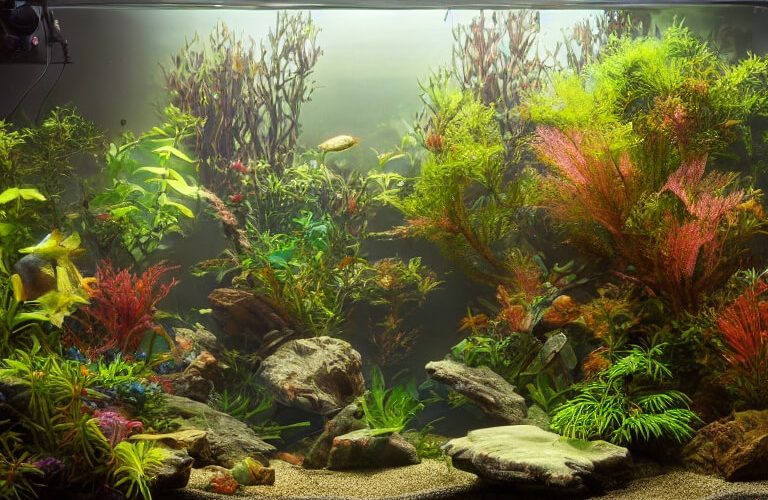A smelly fish tank can be a real nuisance. It doesn’t just ruin the aroma of your home, but it can also impact the health of your fish. We’ve all experienced that unpleasant odor that comes from a fish tank and it’s important to understand why it happens so you can take measures to prevent it.
In this article, we’ll explore common reasons why fish tanks smell and how to keep them smelling fresh and clean.

Fish Tank Odors
Fish tank odors can be a nuisance, as they tend to linger in the air and make it difficult to enjoy your living area. Whether your fish tank is large or small, there are many factors that can contribute to an unpleasant smell. Knowing why fish tanks smell and how to prevent bad odors can help you keep your aquarium clean and fresh.
A foul odor coming from the fish tank could be caused by several things. Usually, it’s due to an overgrowth of bacteria, which leads to poor water quality and a buildup of ammonia and nitrite pollutants.
Having too many fish in the tank can also cause bad smells as their waste accumulates over time without proper filtration or cleaning. Algae growth may also cause unwanted smells if left unchecked for long periods of time.
Common Causes
Having a smelly fish tank can be extremely unpleasant and unsanitary. The most common cause of a bad smell coming from a fish tank is an accumulation of waste, uneaten food, and bacteria in the water. Ammonia is one of the main culprits responsible for a foul odor emanating from the tank; it occurs when nitrogen-containing compounds in fish waste break down into ammonia.
To help reduce unwanted smells in your aquarium, it is important to perform regular maintenance by cleaning the tank, vacuuming gravel, and replacing filter cartridges on a regular basis.
Additionally, water changes should be conducted weekly or biweekly as needed to keep ammonia levels low and ensure proper oxygenation for your aquatic pets. Overfeeding your fish can also increase the chances of having an odorous environment due to excessive amounts of rotting food at the bottom of the tank or on its surface.
Biological Activity
Biological activity is an important factor to consider when trying to tackle the issue of why fish tank smells. Fish tanks often develop odors due to the presence of bacteria, fungi, and other microorganisms in the water. These organisms break down organic matter like food waste, fish excrement, and decaying plant material, releasing a range of noxious gases into the air.
In addition to causing unpleasant smells, these gases can be harmful to your health if breathed in over long periods of time. To prevent this from happening, it is essential that you maintain regular biological activity in your fish tank – doing so will help keep it clean and smelling fresh!
Regularly changing your aquarium’s water and removing any leftovers or excess food particles are key components to maintaining healthy biological activity levels in your tank.
Overfeeding
Overfeeding is one of the most common mistakes people make when caring for their fish tanks. Too much food can lead to an accumulation of uneaten food and waste, which can cause a foul smell in the tank. This is often made worse by other contributing factors, like poor filtration or inadequate aeration. If your fish tank smells bad, it’s worth checking whether you’ve been overfeeding your fish and addressing this issue first.
The amount of food you feed your fish should depend on their size, how much they eat in one go, and how many times they are fed each day. Generally speaking, feeding them twice a day with just enough to last around two minutes is ideal.
Poor Maintenance
Poor maintenance is a major contributor to why fish tanks smell. Fish tanks should be cleaned regularly to ensure they remain safe and healthy environments for your fish, as well as pleasant experiences for the people who keep them. Keeping up with simple tasks like cleaning out uneaten food, changing water, scrubbing algae from walls and gravel vacuuming can make all the difference when it comes to avoiding smelly tanks.
Not only does poor maintenance contribute to an unpleasant smell in your tank, but it can also be detrimental to the well-being of your fish if left too long. Unkempt tanks often contain harmful toxins that can cause serious health issues for your aquatic friends if not addressed quickly enough. To avoid this problem altogether, try setting a regular schedule for cleaning and maintaining your tank and stick to it closely – you’ll thank yourself later!
Dealing with Smell
The smell of a fish tank can be an unpleasant surprise for some aquarium owners. Fish tanks, although beautiful and enjoyable to look at, can emit unpleasant odors that make them less than ideal in the home. But there are ways to combat these smells. In this article, we’ll explore what causes fish tank smells and how to deal with them so you can enjoy your beloved aquarium without any unwanted aromas.
Fish tank odors typically come from decaying organic matter such as uneaten food, fish waste, or plant debris. As these materials decompose they release ammonia which is a highly toxic gas with a strong smell that can cause severe respiratory distress when inhaled in large concentrations.
To reduce the smell of your tank it’s important to keep on top of cleaning and maintenance tasks such as changing the water regularly and removing excess food or debris from the substrate.
Conclusion: Smell Solutions
Smell Solutions: When it comes to fish tanks, the smells they can produce can be overwhelming. However, with the right steps, you can easily reduce the smell and keep your tank smelling great. Firstly, regularly clean your tank and all of its components to remove any build-up of organic matter that may be causing an unpleasant odor.
Secondly, make sure to use a good quality filter system to help maintain healthy water parameters and reduce the potential for bad smells from developing. Thirdly, add some fresh plants or decorations to your tank as these will help absorb odors as well as break down harmful compounds in the water.
Finally, use a deodorizer if necessary – these are specially formulated products designed specifically for fish tanks and will help eliminate any persistent odors quickly and effectively.




